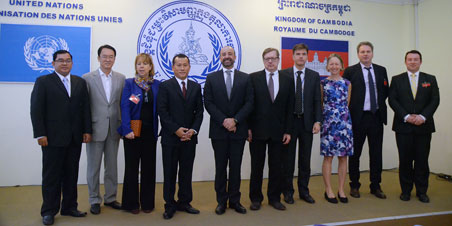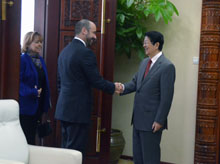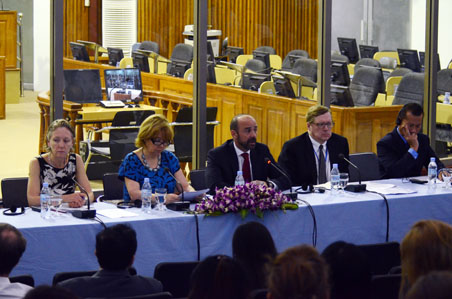|
|
 |
Activities of the Legal Counsel of the
United Nations

Visit by the Legal Counsel and the Controller to Phnom Penh, Cambodia, 27 to 29 January 2014
From 27 to 29 January 2014, the Legal Counsel, Mr. Miguel de Serpa Soares, the Controller, Ms. Gina Casar, and the Special Expert of the Secretary-General on the United Nations Assistance to the Khmer Rouge Trials, Ambassador David Scheffer, visited Phnom Penh, Cambodia. The objective of the mission was to follow-up on a meeting between the Secretary-General with Prime Minister Hun Sen in the margins of the last ASEAN summit in Brunei and to continue the dialogue with respect to the financing and "completion strategy" of the Extraordinary Chambers in the Courts of Cambodia (ECCC) with representatives of the Royal Government of Cambodia, in particular with Deputy Prime Minister Sok An. On the occasion of the visit to Phnom Penh, the UN Delegation also met with senior national and international officials of the ECCC, with staff of the ECCC and with the principal donors and "friends" of the ECCC.
 The UN High-level Delegation with UNAKRT Officials The UN High-level Delegation with UNAKRT Officials
- UNAKRT press release
On the financing side, the Mission obtained assurances for commitments from the Royal Government of Cambodia that will help stabilise the budget for 2014. After the severe funding crises of 2012 and 2013 this represents an important step which will allow the ECCC to fully focus on its important substantive work. Regarding the issue of the completion of the work of the ECCC, the Mission conveyed both to the Government and to ECCC officials that for the UN, "completion" can only mean the conclusion of the cases before the ECCC through independent and impartial judicial decisions in accordance with the UN-Cambodia Agreement and international standards of due process. After the meeting between the UN Delegation and Deputy Prime Minister Sok An a joint statement was agreed upon and issued .
 The Deputy Prime Minister of the Royal Government of Cambodia, H.E. Mr. Sok An, greets the Legal Counsel, Mr. Serpa Soares, and the Controller, Ms. Casar
The Deputy Prime Minister of the Royal Government of Cambodia, H.E. Mr. Sok An, greets the Legal Counsel, Mr. Serpa Soares, and the Controller, Ms. Casar
In order to facilitate a timely completion of the work of the ECCC, the judges committed to cooperate in establishing an indicative timeline accompanied by a narrative which will be updated on a quarterly basis. The principal purpose of the indicative timeline will be to reassure donors and the Government of Cambodia that the ECCC is diligently working towards the timely conclusion of its mandate and to keep the judges and staff of the ECCC focused. The indicative timeline will hopefully facilitate fundraising and ensure that the completion of the ECCC will be a judicial one, not a financial one.
During its stay in Phnom Penh, the UN Delegation met with all senior officials of the ECCC, both national and international. It met with the co-prosecutors, with the co-investigating judges, with the judges of the pre-trial, the trial and the supreme court chambers. In addition, it met with the civil party co-lawyers and with the defence support section. The Mission also met with the Acting Director of the Office of Administration, Mr. Tony Kranh, and his deputy, Mr. Knut Rosandhaug, the UNAKRT coordinator. The UN Delegation also met with staff at large in the format of a town hall.
 The UN High-level Delegation at the town hall meeting with ECCC staff The UN High-level Delegation at the town hall meeting with ECCC staff
The Mission met twice with the international donors, once in the format of the principal donors (Australia, EU, France, Germany, Japan, Republic of Korea, Sweden, UK and the US) and once in the format of the wider “Friends of the ECCC” group. The donors welcomed the outcome of the mission, in particular the securing of the budget for 2014. They were pleased about the prospect of receiving quarterly an indicative timeline and a narrative which will enable them to closely monitor the activities of the ECCC. Special Expert David Scheffer briefed the donors on his fundraising strategy and activities.
In the margins of the meetings, the Mission took the opportunity to visit the Tuol Sleng S-21 Genocide Museum and the Killing Fields Museum in Choeung Ek. The historic events documented in these places are nothing short of shocking, even after almost 40 years of the commission of the crimes. The visits allowed the members of the Mission to connect with the work of the ECCC not only on a professional level but also on a personal and emotional one. No-one who visits these former sites of mass slaughter and torture can fail to recognise the imperative of prosecuting those most responsible.
The ECCC is conducting the trial of the most senior surviving members of the Khmer Rouge regime. Many commentators consider this the most significant international criminal trial in the world at the moment. The UN Delegation’s conclusion, therefore, is that everything must be done to ensure that the ECCC will be allowed to complete its judicial mandate. The Legal Counsel, the Controller and the Special Expert deeply appreciate the Secretary-General’s unwavering commitment to international criminal justice which includes the important work of the ECCC. Everybody who bears responsibility for the success of the ECCC must continue to speak out and to speak positively about the ECCC. The ECCC already contributed enormously to the development of international criminal justice, for example through the civil party participation scheme, which gives the victims a voice and does not degrade them to mere numbers. Further, the ECCC is a Cambodian national court with a mix of international and national judges and prosecutors that has real potential to leave a lasting legacy of increased judicial capacity and greater respect for the rule of law.
The ECCC is an indispensable element of our system of international criminal justice. It must be allowed and encouraged to complete its work.
|
 |